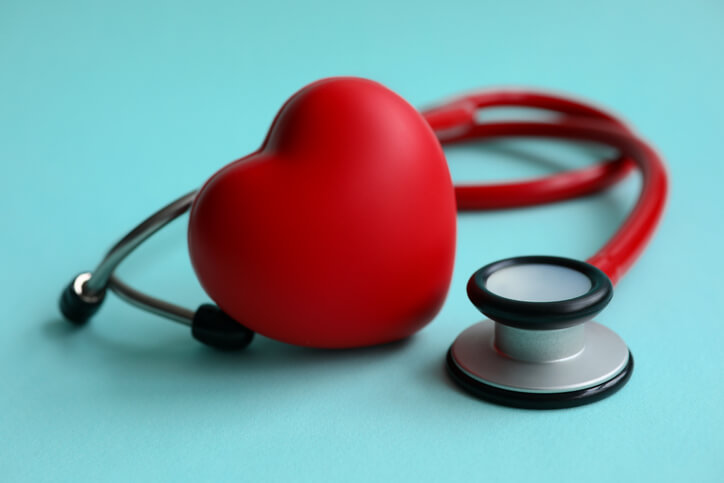You probably already know many of the factors that increase your risk of a heart attack, which occurs when blood flow to the heart is blocked. These include:
- A family history of cardiovascular events
- Diabetes
- Stress
- Lack of exercise
- Smoking
- Excessive drinking
- Uncontrolled high blood pressure and high cholesterol
According to the Centers for Disease Control (CDC), someone has a heart attack every 40 seconds in the United States, which translates to 805,000 people a year. To lessen your risk of becoming part of that statistic and increase your overall wellness, you should pay attention to the well-known stressors. You should also give a thought to other less well-known heart attack triggers that may be surprising to you. Below are the top eight—and what you can do about them.
1. Air Pollution
Well over 60% of deaths attributed to air pollution are due to cardiovascular disease, according to a study published by The New England Journal of Medicine. There are several reasons for this, but the most important is oxidative stress, which happens when fine particles in air pollution (especially from exhaust) damage the heart’s defense systems.
Protect Your Heart:
- Check the Air Quality Index to see when pollution is high: When air quality is bad in your area, minimize your time outside.
- Take B Vitamins: A Columbia University study shows that this vitamin can reverse the detrimental effect of air pollution on the heart.
- Reduce your time stuck in traffic: Instead, you can try taking the scenic route to avoid tie-ups.
2. Anxiety, Depression, Stress and Rage
Prolonged stress from uncontrolled negative emotions, like road rage, can pack a wallop on your heart health. According to the American Psychological Association, people with clinical depression have twice the risk of heart attack for up to 10 years after a depressive episode. Another study published by Harvard Medical School found that people with high levels of anxiety and anger are at a higher risk for a heart attack.
Protect Your Heart:
- Seek help: Look for a trained, accredited psychotherapist who can help you develop coping strategies. If necessary, they may prescribe medication.
- Practice mindfulness and meditation: A statement published in the Journal of the American Heart Association reported that meditation may reduce your risk of a heart attack. (Search “guided meditation” on YouTube to get started.)
- Reduce your stressors: If you are feeling overwhelmed by life, divide your responsibilities up by what you must do, what you want to do and what you should do but’s it’s not that important. Get rid of the third one! Then ask yourself what chores you can delegate to someone else.
- Exercise: No, you don’t have to become a gym rat, but get your body moving in a way that sparks joy. Whether it’s a daily walk, yoga session or bike ride, find what feels good to you. The Mayo Clinic recommends 75 minutes a week of aerobics. They also suggest doing strength training for all muscle groups twice a week for around 12 to 15 repetitions.
3. Skipping Your Flu Shot
The flu is nothing to mess around with. An investigation published by the Mayo Clinic showed that coming down with the flu is significantly associated with heart attacks and heart failure.

Protect Your Heart:
Get to a healthcare professional or pharmacist to get your flu shot every year. At most pharmacies, you won’t even need an appointment. In addition, use the below precautions:
- Wear a mask
- Stay six feet apart when you are out in public
- Wash your hands frequently
4. Migraines
People with a history of migraine headaches have an increased risk of a cardiovascular event, according to a study sponsored by the American Migraine Foundation. They also showed a twofold increase in the risk of stroke. Migraines differ from headaches in their intensity. They are often accompanied by nausea, auras and sensitivity to light and sound.
Protect Your Heart:
If you suspect you have migraines, see a doctor right away for diagnosis and a healthcare plan that will include medications that can prevent migraines or give relief during one. Also, learn and avoid your migraine triggers—the most common ones are:
- Alcohol
- Stress
- Bright light
- Strong smells
- Sleep disruption
- A change in barometric pressure
- Food additives such as monosodium glutamate (MSG)
5. Sleeping Too Little—Or Too Much
Sleep recommendations say to aim for six to nine hours a night. A recent study published by the Sleep Foundation looked at what happens when you go over or under that amount. Results: People who slept longer than nine hours had a 34% higher risk for heart attack, while people who caught less than six hours of sleep had a 20% higher risk.

Protect Your Heart:
For Short Sleepers:
- Establish a firm bedtime routine and stick to it.
- Make your bedroom a sanctuary—banish all technology that might tempt you to stay up.
- Don’t use any lighted technology for the hour before bedtime.
- Don’t drink alcohol in the hours leading up to sleep. Contrary to popular belief, it actually disrupts sleep and causes shorter sleep cycles.
- Intense exercise right before sleep will just jazz up your system. If you must, gentle yoga stretches can actually promote sleep.
For Long Sleepers:
- Stick to a strict sleeping schedule, even on weekends.
- Use a natural light alarm clock. These emit a glow that gets stronger, mimicking the rising sun, which signals to your circadian rhythm that it is time to get going. Some also include gentle wake-up sounds.
- Check your medications with your prescribing doctors. Some can be very sedating. (Never stop a prescribed drug without first talking with your physician.)
- If you find that despite all this, you still feel exhausted, see a doctor. There may be an underlying medical reason you’ve lost your get up and go, such as obstructive sleep apnea (when you stop breathing for a moment while sleeping). This in itself is a risk factor for heart attack.
6. Gum Disease
A study published by the CDC found that around 47% of American adults have some level of periodontitis, a serious gum infection. So, what has that got to do with your heart? Several studies have shown that there is a link between gum disease and heart disease. Researchers aren’t entirely sure why, but guess that it may have to do with the inflammation.
Protect Your Heart:
- Prevent gum disease: Brush your teeth (and tongue) after meals, floss, rinse with mouthwash and see a dentist or periodontist regularly.
- Know your risk: Smoking, age, diet and genetics can all increase your chances. Talk with your dentist or periodontist about how to minimize them.
- See your dentist at the first signs of gum infection: If your gums are swollen, bright red, tender to the touch, bleed easily, pull away from your teeth or if your teeth feel loose or crooked, they could be infected according to the Mayo Clinic.
7. Cold Weather
When the temperature gets frigid, your heart has to work harder to try to keep your body warm. In addition, your arteries constrict, which limits blood flow to the heart. But don’t worry, you don’t have to move someplace warm to keep your heart healthy.

Protect Your Heart:
- Dress warmly in layered clothing: This helps trap the heat inside. Don’t forget a hat and gloves.
- Wrap a scarf wrapped loosely around your mouth and nose: This allows you to breathe in warmer air.
- Wear waterproof boots or shoes: This way if you step in a puddle, you won’t have freezing toes or feet after.
- Use hand warmers and toe warmers: Slip them into your gloves and boots to stay warm in extra cold conditions. You can get disposable or battery-operated ones.
- Stay hydrated: Bring along a thermos of something hot – cocoa, coffee or tea, for example.
- Take breaks inside: If you feel yourself getting uncomfortable (shivering, feeling numb, tingling or stinging), go inside and warm up.
8. Rich Meals
It’s hard to resist a rich, tasty meal that starts with hors d’oeuvres, flows with wine and ends with gooey chocolate dessert and maybe a digestif or two. And while it’s great to treat yourself from time to time, your heart may have something to say about it, especially if it becomes a regular habit. Data shows that your risk for a heart attack is quadrupled within two hours of a heavy meal, particularly if you are already diagnosed with heart disease, according to UCI Health, California.
Protect Your Heart:
- Snack satisfying: Try having more high-protein snacks throughout your day, such as yogurt, nuts, edamame or veggies and hummus, so you will be satisfied and properly fueled before heading into dinner.
- Balance your plate: When looking at the spread of appetizers, try to diversify your plate. Instead of loading up on one specific thing that may not be the most healthy, instead ask yourself, “What can I add to my plate to make it more satisfying and nutritious?”
- Pace yourself: We tend to get excited at big meals and eat really quickly. When that happens, your body doesn’t even get time to register that it’s full. Listen to your body, and be mindful of when you are eating, how it is making your body feel and when you feel satisfied.
The heart is a complex organ, and there are many factors involved in keeping it healthy and strong. Think about these eight additional heart attack triggers and how you can add in more protection to keep you going for years to come.
Were you surprised by some of these heart attack triggers? Will you change some of your habits, and if so, how? Share in the comments below.







Yea! This article is helpful.
Great info, confirms what “Health Healthy” class shared with us at the Texan “Y”! Thanks
I am taking medication for rapid heart rate.This information is very helpful to me.I will be trying to move my body more. Thanks
Very Good Info.
Very informative and good tips in an easy to read format. I picked up a few tips that I wasn’t really aware of which I appreciate.Thanks!
I love receiving these bulletins. They are informative, concise, and easy to read. Thank you.
Thank you for sharing, yes my Heart Doctor told me that Muffin’s are one off the Danger List, and cakes. Grab an Apple 🍎 or something more nutritious to your health. Eat organic. Meat 93 or higher lean, in my 5 weeks no pain, I feel good!!!
Very informative, great advice, thank you..🥢✌
Excellent article, which every age should read. Once you’re over the age of 60 all of us need to be a bit more caucus, like the simple things of taking a walk, getting enough sleep, they really make a difference in our lives. I feel better after a short walk, but I wasn’t aware of Not continuing to get a flu shot, the harm that can do. Living in the San Francisco Bay Area, I always have a coat in the car, just in case. Living in Marin and heading into the Fog, San Francisco, that coat is a must!
All of those warnings are scary.
THEY’RE SUPPOSED TO BE!!!!!!!!!!!!!!!!!
Follow those good ideas and life won’t be so scary after all !
Good information 👍
Very enlightening
I have a family history of heart disease, so early on I decided to exercise daily, eat healthy, avoid alcohol, cigarettes etc, and still had a heart attack before 70. No harm to my heart because I was healthy, and it was stress induced. Now I pay close attention to my mental health and practice releasing stress before it builds up. Also, no more unhealthy indulgences when I’m upset! It all matters. Listen to what your body is telling you before it’s too late.
Very informative. I learned some things I didn’t know
Nice article. I think cold air on your lungs is very bad. I suggest you walk in a mall when it is very cold. Or use an indoor treadmill. I am 87 years old and walk without a cane or walker and I have excellent balance and still ride a two wheel bike and I don’t fall because I have been a walker all my life. I feel exercise is a very important thing to keep you young.
I appreciate the info and feel good articles. They help greatly. I’m working toward mindful improvements throughout!
THANK YOU.
Nancy – So glad to know you enjoy the articles and find them useful. Thanks, Jenn
Suggest taking a walk and skipping dessert. If you don’t bother sweets, they will not bother you. Sugar is addictive. Slice an orange. Thanks for helpful reminders.
Very informative article. Although I have heard most of these points before, reading this article reminded me that I need to act on some of them to improve my overall health and avoid future problems. Thank you!
It is odd that you recommend yogurt but suggest a pass on whipped cream. All dairy is bad in that, among other things, it aids the growth of cancer and diabetes, premature body changes in boys and girls, etc. See “The China Study” and the many YouTube videos on the negative effects of dairy.
I enjoy reading articles from Hartford. I find them that although the information may not be new, you write it in more details and in ways that don’t make it sound like it came out of an encyclopedia.
B. – So glad you enjoy the articles and that you find them informative.
excellent article ,full of information and easy to follow directions ,90 percent of article contents i have been following and has been doing.at age 71 i am full of life,active,hiking, jogging 8miles a week intotal.No health issue and zero medication. I would advice to follow for wellbeing and enjoy every moment of life
This was very interesting and helpful. I will try to keep them in mind and integrate or adjust as needed. Thank you for providing this information
This was very informative. I appreciate these articles. I see some changes I can make. Thanks!
Thank you for this helpful information! I will try harder!
Thanks. I was not aware of the migraine connection to heart attacks and stroke.
I find I disagree with the’’ Sleep’’ section on these recommendations, I believe that if your body is tired enough to require 10hrs sleep, then you should let that happen, & get out of bed at that time,….not sooner! The exception would be if you just HAVE to catch that Train or Flight. ( or you have a grumpy old boss at work )
Great advice! Thank you Hartford for sharing all this informative information. Too many of us already know most of this info, however we tend to forget about it and need a gentle reminder.
Namaste… 🙏
Amen.
Almost passed on reading this article. Found that gum disease is a trigger and have been putting off going to the dentist with some pain of an unknown origin. I will now. Thanks for this informative email.
Dan Wetherall
Life is not a spectator sport! #believeinyourself
Stop worrying about the things that you have no control over. Frequent worry causes anxiety which is bad for your heart. The other things you mention in this email are also helpful and healthy for your heart.
An aperitif is before dinner, a digestif, after dinner.
Good catch! We just updated this. Thanks!
I was just introduced to an exercise program called, “Ageless Grace”. ( Many may already know it). It seems like a winner. I really enjoy your newsletter. Thank you. Please keep the brain games coming.:)
Thank you for mentioning “Ageless Grace.” I had never heard of it. I looked it up, ordered it, and just received it. I think it is amazing and am looking forward to seeing results!
I went through your list and checked off what I should be doing. I can improve on some of them. I do feel I am better at these now that I am older. Thank you for making me reassess what I do,
Re: handwarmers in your boots — that’s a BIG no-no, as they can create enough heat to result in burns when used that way! Please use TOE-WARMERS — made for use in boots — instead. Both are made by a company called HotHands and are reasonably priced, available at Wal-Mart, many sporting goods stores, hardware stores, and more….
Here’s a hot tip: hand-warmers (especially the 10-hour ones) can be re-used! When you come in from the cold, store them in a small glass jar (baby-food sized) with a tight lid. To use them again, shake them out, pinch any small lumps you feel, & let them begin to warm up before you insert them into your mitt or glove pocket. The foot-warmers are not so easy to restore due to moisture in your boots, but it’s worth a try!
E.J. – Thanks for the heads-up. We’ve updated to include toe warmers as well. Thanks for reading.
Very helpful!
Very interesting and informative.
I liked your suggestion to take a walk after dinner and before dessert!
Lots of good thoughts and info here. Most I’m doing, but eating slower and walk before dessert is good idea. I live in an independent living facility so evening meal is excellent and served to us. Lots of temptation. The high-protein snack before dinner, I plan to try!
Very informative, thanks a million!!
This was interesting and helpful.
I nice reminder! Thanks.
Do not have anymore comments at this time
thank you
i used to go to the ymca 5 days a week before the pademic. i still do 30 minutes a day at home on my upper body. i was ready to go back to the y but they shut the exercise part down to make it a child care. i am trying to find somewhere to go now.
Very helpful information, but I once read that you can cough hard when you feel some of the symptoms that was just mentioned. Is this a idea that works,because it worked for me before and when I did it it was when I had a rapid heartbeat after taking a prescribed medication. I ended up feeling just fine.
This was timely, clear and to the point without any fluff:)
Your articles always contain useful information. Thank you.
Having a difficult time controlling my husband’s diet being that he is diabetic and severe blocked arteries. Not a candidate for surgery. And he has advanced RA which makes difficult for him to get around.
Is there a good book for heart patient with diabetis? Type 2 diabetic on a long acting insulin shot. A
A easy to understand book. I might add. Nutrition can be difficult 😢
I found this to be very helpful. I need to do more of what you said to do. Thanks for the information
This is very informative. Thank you. I need to get busy . I need more exercise.
FOR BLESS
Enjoyed the informative read thank you for posting. Have enjoyed past posts and look forward to future ones
This was very interesting
How does dysfunctional bowel syndrome affect the cardio system?
What are symptoms for wimen??
Didn’t know that air quality is bad on the heart but was enlightened to know that I’ve been doing many of the things that are good for the heart.